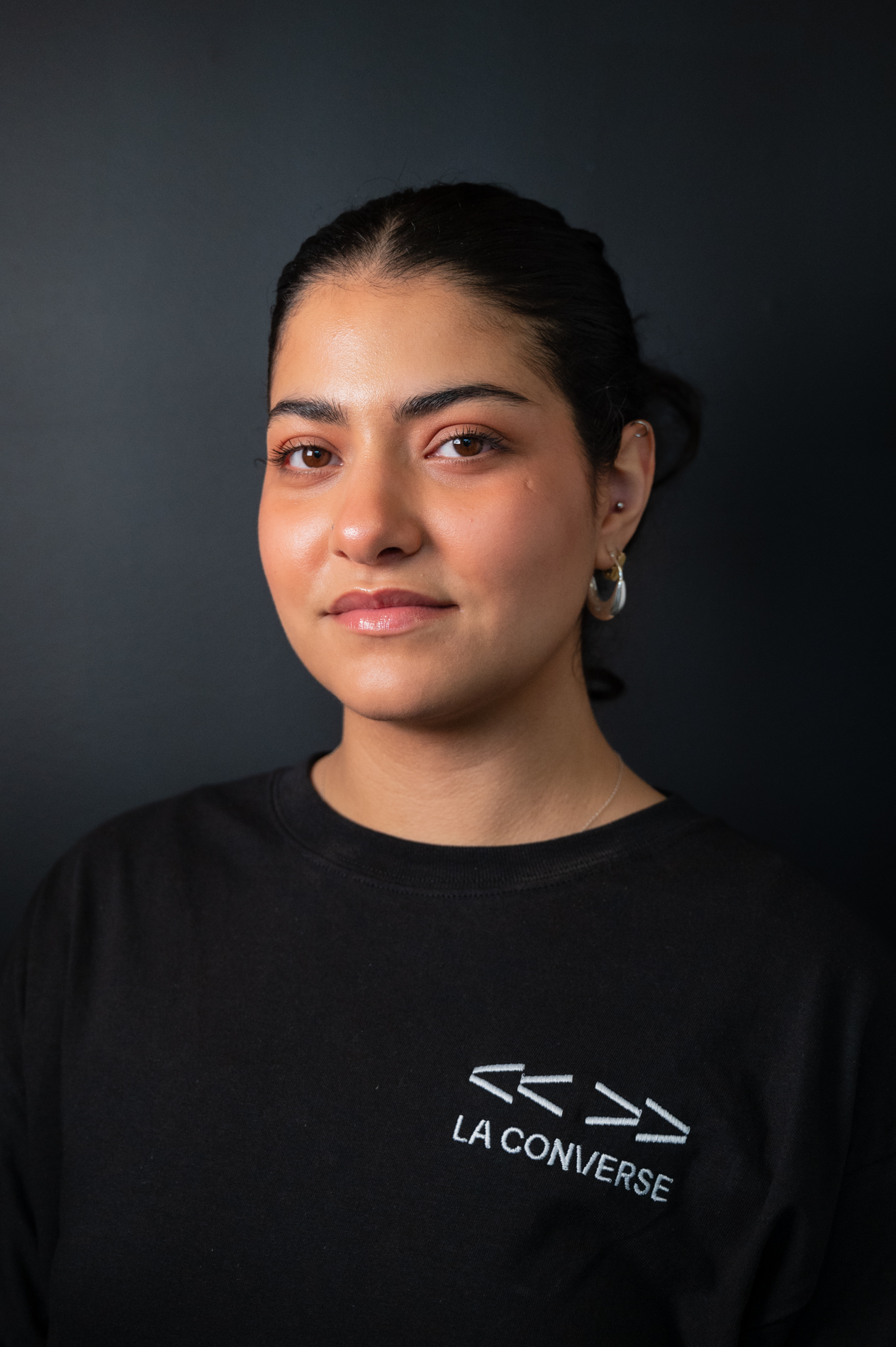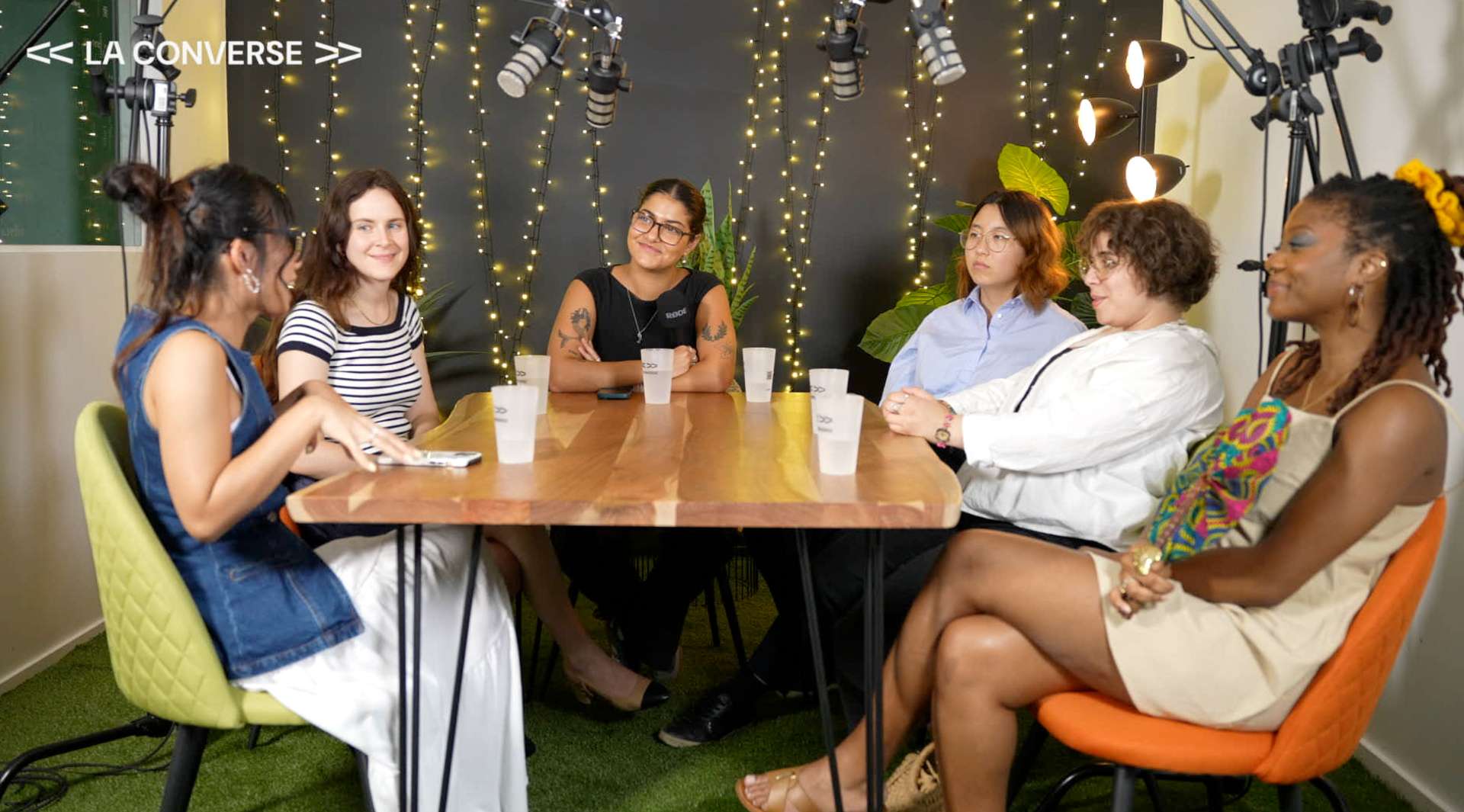For many young Montrealers from different diasporas, the months of July and August bring a certain nostalgia. For many, it's an opportunity to return to their country of origin to be with their family. This reality is what led to the theme of our dialogue.
The La Converse studio is bathed in soft light. The chairs arranged around the wooden table are reminiscent of a night friends might spend chatting in a dining room. The conversations start slowly, and laughter erupts at times. The participants arrive one by one, greeting each other shyly and taking their seats. For this edition of our dialogue night, a few curious people are present as an audience.
It's 6:30 pm when everyone settles in. The microphones are set up in podcast mode, allowing each person to share their experiences in a natural conversation.
Returning home: between reunions and distance
Julie is the first to start. She was born in Montreal to Vietnamese parents. She speaks with confidence and firmness, but her tone softens when she talks about Vietnam. "Before, I'd say I was going on a trip. Now, I say I'm going back home to see family," she says with a smile. Her returns home have become an anchor: "The more I go, the more my ties are strengthened."
Beside her, Ioana straightens up. She arrived from Romania at the age of four. Her first return, eight years after arriving, left a mark on her: "During all that time, I built an idea of the country through my parents' stories. Finally going there, I was able to form my own opinion." But she also noticed a disconnect. "For my parents, Romanian identity is linked to communism. For people there today, that's not what it is anymore," she explains.
Tian follows. She was born in China. "When I was little, I always used to ask my parents: 'When are we going back?'" she says with a little laugh. But over the years, her relationship with China has changed. "Now, I feel like a visitor there. Canada has become my home," the young woman states.
Imène then speaks: "I've only returned to Algeria once since I immigrated," she says. Her voice trembles slightly. "Seeing my family again brought me comfort, but also a lot of sadness. You realize what you've lost. Faces change, children grow up... and so do we." Julie, touched by her testimony, nods. She adds softly: "I sometimes wonder, when my parents are no longer there, what will my connection to Vietnam be."
Being from "over there" without having grown up there
Solemani, who was born in Belgium and is of Congolese descent, then takes over. She has never set foot in Congo, even though she has tried to go several times. "I'm very chauvinistic when it comes to my country: for me, Congo is the best country in the world!" She laughs, but her tone then becomes more serious. "Here, when I meet Congolese people who grew up there, I'm often reminded that I'm not a 'real one'," she testifies. Today, she tries to get closer to her roots through her studies in sociology. Her research topics are often related to Congolese culture.
Little by little, the conversation shifts to language. Imène explains that she has "a different personality depending on the language" she speaks. Julie, for her part, sometimes catches herself understanding the mistakes she makes in French: "I realize it comes from Vietnamese. Language structures how we see the world."
Little by little, the conversation shifts to language. Imen explains that she has "a different personality depending on the language" she speaks. Julie, for her part, sometimes catches herself understanding the mistakes she makes in French: "I realize it comes from Vietnamese. Language structures how we see the world."
What if you couldn't go back?
Then a question arises: what would become of this connection if a pandemic prevented them from returning to their country of origin for 20 years?
Imène believes that identity would persist thanks to social media, music, food, and the cultural elements she would continue to be in contact with. Solemani adds a nuance: "Even without the internet, Congo runs in my veins. While it's true that we miss the updates, the culture continues to evolve without us." Ioana takes a more measured tone: "In the short term, the identity holds. But over several generations, it transforms. It becomes a mix, a new culture."
In the circle, everyone seems to be thinking about what it means to grow up with a plurality of identities. Solemani summarizes what they all express: "We are neither one nor the other; we are a mix of both."
Smiles appear, heads nod. The evening concludes in a warm atmosphere. After an hour and a half, the discussions slowly fade, making way for a question period initiated by members of the small audience. Summer is for playing, but for some, vacation awakens reflections on identity. The conversations quietly continue as the microphones and cameras turn off. The participants and the audience still seem to have things to say to each other.
Did you enjoy this article?
Every week, we send out stories like this one—straight to your inbox.





.jpg)

%20(1).jpg)
%20(2).jpg)
.png)